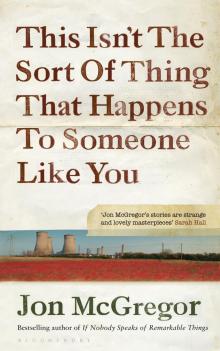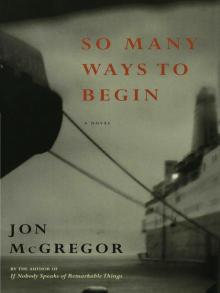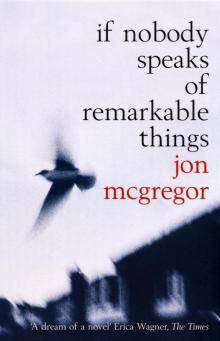- Home
- Jon McGregor
If Nobody Speaks of Remarkable Things Page 7
If Nobody Speaks of Remarkable Things Read online
Page 7
He picks up the tray and carries it through to his wife.
Chapter 11
And so today I’m back on the telephone.
I’m listening to my mother talking, and I’m waiting for the right moment to interrupt.
I know that I have to tell her, I know that I will be able to tell her if I use the right words at the right moment.
I know what the right words are, I’ve been sitting here for hours, choosing and unchoosing.
And I know that I need help now, that in spite of everything my mother is the person to ask.
I’m scared, I have always been scared at times like this, waiting to say something, waiting to be told off.
Falling off the garden wall, and she says what the hell were you doing up there anyhow while she cleans the graze and presses a bandage around it.
Dropping my dinner on the floor, and she shouts at me and sends me to bed, and when she brings me a sandwich later I throw it out of the window.
My dad, saying nothing at these times, averting his eyes, folding his hands.
I remember my dad taking me to school, when I was very young, when my mother was ill.
The feel of his huge hand wrapped around mine, rough and hard and warm.
The length of his strides, and having to run to keep up.
The very cold days when he’d wrap his scarf around my face until it almost covered my eyes, and when I breathed in I could smell him in my mouth, damp cigarettes and bootwax and the same smell as his hair when he said goodnight.
I remember that once he had to take me early so that he could get to the shops before work, and I went and hid in the corner of the playground, behind the bins, with the scarf wrapped completely around my head like a mask.
I remember how safe I felt, wrapped up like that, blinded.
He didn’t say anything during those walks to school, but I used to look forward to them, I used to be secretly and ashamedly pleased if my mother didn’t appear for breakfast, impatient to leave the house.
I wonder if he’ll say anything now.
I wonder if he’ll turn away from the television, come to the phone, say something.
I listen to her talking, and I remember those times she was ill, those strange blotches on her otherwise busy life.
I remember the way it would go almost unmentioned, as though nothing out of the ordinary had happened.
As though there was nothing to be concerned about.
I remember having to creep into her room to say goodnight, her puffed red face turning to me from amongst the pillows and the blankets, the curtains closed and a desklamp pointing up at her from the bedside table like a stagelight.
I remember trying to hold my breath while she asked me how my day had been, if I had been good, if I had done the washing up.
And her voice sounding strange, thick and slow, as though she was talking from behind a closed door, through a thick wall.
I’m not sure if I held my breath because of the smell or because I was scared of catching her germs, but I always came out of that room dizzy, sucking down lungfuls of air.
And it never worried me, because she always seemed to be better the next day, saying oh it must have just been a bug, one of those things, you know, and she’d be back to normal.
Bustling around the house, cleaning, tidying, baking scones, rearranging the furniture.
She’s still talking, and I’m still saying yes and no and I’m sure, and I’m having trouble working out what she’s talking about and I want her to stop.
I hear a mobile going off, an electronic Für Elise, and I assume it’s on the television.
She says oh that’s my phone, do you mind if I, and without me saying anything she’s pressing buttons on her new phone and saying yes, hello, yes fine, hold on a moment.
She says it’s your Auntie Susan, was there anything else? I say yes, yes there is something else, can you call me back, and she says oh, oh okay, and I hear her talking to Auntie Sue before she’s even hung up on me.
I didn’t know my mother had a mobile phone.
I make a cup of tea, and I listen to my answerphone, to a message from Sarah. She says hi again how you doing, I’ve got something to tell you, I met somebody, I need to tell you about it, call me soon bye.
The phone rings, and I’m talking to my mother again.
She says and have you been eating properly.
I say mum I’m a grown-up now you shouldn’t be asking me that sort of thing.
She says well yes of course but.
There’s a moment’s pause, I can hear the television in the background.
I say and how’s dad, oh you know she says.
Same as always she says.
She asks me about friends I haven’t seen for months and I say I don’t know I haven’t seen them.
I live in a different city now I say, it’s difficult to see people so often.
She says he could do with a haircut though.
This needs to be an important conversation, and it’s not.
I say who needs a haircut, your dad she says, it’s sticking out round his ears.
You know the way it does she says.
I loop the telephone wire around my finger, the spirals hugging tight between my knuckles.
I say well have you told him, watching the skin beneath my fingernail turn red as the wire tightens.
Oh no she says, you know he doesn’t like me saying things like that.
I think about him there now, watching television, his feet up on the table, the dark patches on the soles of his white socks.
I uncoil the telephone wire from my finger.
There are red stripes, white stripes.
She’s talking about dad’s sister coming to visit.
Your Auntie Susan she says, and then she’s talking about spare rooms, and bedding, and extra pints of milk.
She says you know she’s got an insatiable appetite for tea, and she does like it with a lot of milk.
I need to stop her talking now.
I need to say mother I have something to say.
Mum, please, I need to tell you something.
It’s important mum, and I’m scared and I need your help.
I need to say these things.
My throat feels tight, squashed.
I open the window to get some air into the room, and a burst of noise rushes in.
Traffic, and shouting, and music.
And birdsong, from somewhere up on the roof, a thin twitter that creeps and tangles in with all the other sounds.
I breathe deeply, trying not to sigh.
I wrap the telephone cord around another finger.
Mum, I say.
I see the girl from the shop downstairs crossing the road.
She glances up and sees me, she waves and smiles.
I lift my hand to wave back, but it’s held down by the telephone cord and she disappears.
Mum, I say, again, can I just, but she doesn’t hear me, or she won’t let me speak.
And how about you she says, when are you next coming down, it’s been a good long while hasn’t it?
I don’t know I say.
She says your Auntie Susan’s slept in that spare room more times than you I should think.
I say mum that used to be my room, I slept in it all my life, she says yes well I mean since I decorated it.
Since it became the spare room she says.
I say mum, there was something I needed to say, can I just, and she says sorry love what was it?
I hesitate, I squeeze a coil of telephone wire into my fist.
I say mum, I’m pregnant.
Chapter 12
She’s balancing on one foot again, the sister of the twins, and now she is leaning forwards, bringing her face towards the ground, her other leg cocked out behind her and her arms thrust out like glider wings. A young man with very short hair walks past, slowly, his feet are shuffling along the pavement and once or twice he stumbles. She doesn’t notice him, an
d he disappears into a passageway next to number sixteen.
In the back bedroom of number twenty, the wife of the old man with the weary lungs is drinking a cup of tea, standing by the window, looking out across the yards, along the backs of the houses in the next street, down the alleyway. She sees a white cat roll onto its back on the roof of an outhouse. She sees a woman hanging out washing, pegs lined up across the shoulders of her blouse like a queue of trapeze artists. She sees a young man with very short hair emerge from the passageway a couple of doors down and shuffle up the alleyway, towards their backyard. She watches him, she notices his face all screwed up against the sun, his hand held to the walls for support, and she tuttuts to herself, she sucks in her breath.
She says well will you look at this one.
What a state she says, he can hardly walk.
Been out all night I should think she says, and she watches him stumble into the backyard two doors down, coughing, pulling out a key on a long chain from a pocket halfway down his trousers.
We never stayed out all night in my day she says, watching the door close behind him, it wouldn’t have been on would it now?
No love, it wouldn’t, her husband mumbles from the bed, deadpan, not at all love he says.
She says and the state of that yard down there is getting a joke.
She turns away from the window and walks across to the wardrobe, looks like a nice day she says, and she rattles through the clothes on the hangers. Her husband looks at her from the bed, good lord he is thinking, but she is still a woman. All these years he thinks, smiling, and no less a woman than she ever was. He looks at her nakedness, savouring it, the sags and the wrinkles, the way her shoulderblades jostle against each other as she reaches up to the shoeboxes on top of the wardrobe, the thumbsized ridges of her spine, the fleshy weight of her backside, the curve of her belly as she turns into the light with a dress in each hand.
He remembers the first time he felt the weight of that backside, the shape of the weight pressed against his knees and his thighs, and not knowing where to put his hands as she sat talking to her friend, giggling and smoking his cigarettes. Knowing she was being improper, both of them, but knowing that somehow there were rules which didn’t apply. Of course, later, she’d always denied that that was how they’d met, later she’d told a different story, a more refined and sensible story; but he remembers it well enough, oh indeed, the way she’d wriggled to get comfortable, the way she was making his uniform scratch and pull against himself.
She stands there now, looking at him, weighing up the two dresses, one in either hand like a pair of scales, now then she’s saying, look here, which do you prefer?
Downstairs, the man with the carefully trimmed moustache is sitting at his kitchen table with an empty mug of tea, puffing out his cheeks and shaking his head. He stands suddenly, pulling up the blind and reaching for the telephone. It is not office hours, but he will leave them a message, it is easier to talk to them that way, they cannot interrupt or contradict, or pretend they do not understand his voice. Right he says, hello, and he says his name. I have spoken to you before he says, you remember perhaps, about this removal situation in my backyard. He says his address, slowly and precisely, and his lips are quivering with irritation. My backyard is full of rubbish he says, full, and none of this is mine. I feel I am losing control he says. I tell you about this before, five, six, many times, and always you say you coming soon but I don’t see you he says. So I will ask you again, and you will come and take them away, please, he says. He begins to list the items in his backyard, individually, the broken chairs and unstuffed mattresses, the milkcrates and binbags and magazines, the pizzaboxes and chipwrappings and small heaps of builders’ rubble. He doesn’t understand where it comes from. He doesn’t understand who goes to the trouble of heaving all this stuff over his wall. He comes to the end of his list, he pauses for breath and says you see there is so much of it now, I don’t know but I think when it is here it encourages people, like perhaps they think I am running a scrapyard or something like this? Because this morning he says, and he sighs and he looks outside, this morning this is it, this is the last thing, I look outside and I see three of these shopwindow dummy people there also. Please take this away he says. None of this is my mess he says, and he puts the phone down.
He looks at the mannequins, naked, sprawled across the rubbish and across each other, their limbs tangled, and he looks away.
In the street, sitting on the low wall outside number eleven, the young man with the sketchpad is pencilling in an outline of the young girl, standing one-legged by the passageway beside number sixteen, peering into it. It is good to put figures in drawings like these, he has learnt this, his tutor said the presence of people lends a sense of perspective, so he sketches her in and later he will include also adults. And the dog he promised her.
In the back bedroom of number seventeen, the boy with the white shirt lies awake, looking at the girl beside him, her eyes, the thin arch of her eyebrows, the dusting of glitter around her eyes. He leans his face towards her to feel the warm push of her breath on his forehead, he leans back to look at her, props himself up on one elbow to look at the whole long length of her. He remembers the way people looked at her last night, in the club, the way people always looked at her when they were out, the way he’s looking at her now; appraisingly, admiringly, a breathless yearning which is not really or not entirely sexual but something else, something noble or aesthetic perhaps. He hears himself whispering Jesus I’m so lucky, and he looks up quickly to check no one’s awake. But it’s true he thinks, he is, and he lies back down, closing his eyes in sweet anticipation of the weeks and months and maybe years to come. They haven’t made their plans yet, they’re not sure what they’ll be doing or where they’ll be, but he knows they’ll be spending their nights enclosed together like this, he knows he can take that much for granted. The fact that they haven’t even needed to discuss it makes it all the sweeter, like it’s a given, like it’s as natural as a cup of tea in the morning, or a shared cigarette. He kisses the corner of her lips, with his eyes still closed, and he drifts back into sleep.
In the empty back bedroom of number twenty-two, the girl with the short blonde hair and the small square glasses is standing by the window, finishing a piece of toast. She’s resting the back of her head against the cool glass and looking into the room, thinking about the boy who moved out a week ago, looking at the bare sagging mattress, the empty noticeboard, the lightshade concertinaed on the floor. The squares of wallpaper where posters had been, the pattern bright and clear and sharp. She thinks about her own room, overcrowded with clothes and books and tapes and all the dozens of bits and pieces that don’t seem to belong anywhere but can’t quite be thrown away, she wonders where to start.
She goes into her room and takes the posters off the wall, she opens the wardrobe and piles the clothes on the bed. She takes everything off the windowsill and puts it into a shoebox, and then she stops and looks at it all.
She goes downstairs to make a cup of tea.
In the bathroom of number eighteen, the young man with the dry eyes packs his toiletries into a bag and wipes old soap and hairs from around the edge of the sink. He opens the mirrored cabinet, taking down the toppled tubs and cans and packets he knocked over earlier, shaving cream and shaving foam, deodorants, eye lotion, hairgel, shampoo, antiseptic cream, plasters, aspirins, peppermint foot scrub.
He looks at the foot scrub, he takes the lid off the almost full tub and smells it, it’s a good smell, a tingling smell, a nose-clearing steam of a smell and he turns his head away from it and puts the lid back on, puts the tub in the bag. He remembers buying it the day before that Wednesday night, the night he’d opened and closed the front door a dozen times, checking. He remembers thinking it would be a nice thing, a thing they could do later, weeks or months after this first night became a reference point, she could say she was tired after a long day at work or whatever and he could offer her this, as a gestu
re, as a symbol, like it’s nothing really it’s just a thing I would do for you.
He remembers thinking he was getting ahead of the situation by buying something like that so early, but he’d seen it by chance and he’d thought why not, he’d thought it would be good to have it around so he could make less of an issue of it, like here I’ve got some of this would you like some.
And he remembers that awestruck Tuesday night, trying on different clothes and making his room tidy but not too tidy, and he’d decided he should maybe try it out, see what it was like, make sure he knew how to use it, and he’d got a bowl of water and a towel and sat on the edge of his bed with his trousers rolled up. Paddling in hot tapwater, dabbling with the possible way of things.
The way he’d scooped out a handful of the cold grainy cream and rubbed it into the skin of his feet, circling across the arches and squeezing between the toes, enjoying the cold lick and tickle of it, pulling at the skin, working his thumbs along the lines of muscle between the bones, the way he’d varied the pressures, a fist twisted roughly into the hard skin of the heel, a finger running like a whisper along the tendons between ankle and toe. He remembers that evening, the excitement and fear and disbelief, sitting on the edge of his bed with his foot in his hands, thinking maybe soon it would be someone else’s foot, thinking maybe soon there would be someone else sitting on the edge of his bed, sitting beside him.
Lying beside him, sleeping beside him.
He remembers rinsing his feet in the hot water, padding damp footprints through to the bathroom, pouring the slow swirl of murky water down the sink.
He squeezes his eyes shut, he runs his knuckles along the open space between his lips.
He thinks about her, at this moment, in her house, a few thin walls away, packing her life into boxes and bags and he wonders what memories she is rediscovering, what thoughts are catching in her mouth like the dust blown from unused textbooks. He wonders if she has buried any traces of herself under her floorboards. He wonders what those traces would be if she had. And he wonders again why he thinks about her so much when he knows so little to think about.

 This Isn't the Sort of Thing That Happens to Someone Like You
This Isn't the Sort of Thing That Happens to Someone Like You Reservoir 13
Reservoir 13 So Many Ways to Begin
So Many Ways to Begin If Nobody Speaks of Remarkable Things
If Nobody Speaks of Remarkable Things The Reservoir Tapes
The Reservoir Tapes Even the Dogs: A Novel
Even the Dogs: A Novel